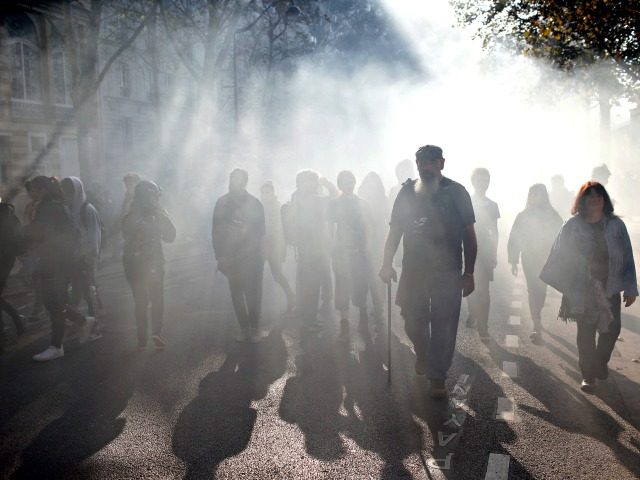Allies of French president Emmanuel Macron say they have yet to grasp why protesters are “seething anger” over the government’s plans to hike gas prices, while one lawmaker worries the “crisis” runs deeper than the cost of fuel.
Anti-government protesters clashed with French police on the Champs-Elysees in Paris on Saturday, leaving the area cloaked in tear gas and smoke from fires on a fresh day of demonstrations against Macron. Demonstrators wearing the yellow, high-visibility vests that symbolize their movement threw projectiles at police, preventing them from moving along the famed shopping avenue, which was decked out in twinkling Christmas lights.
“They’re expressing a seething anger, which we know about,” parliamentary deputy and Macron ally Thomas Mesnier said, as quoted by the New York Times. “People are waiting for results, and they are waiting for their daily lives to improve.”
Nicolas Démoulin, another ally of the embattled president, called the “Yellow Jacket” protests “a movement without precedent,” adding that lawmakers “don’t have a good diagnosis of it.”
“We’ve got to go to these citizens who feel they are completely shut out of politics,” he added.
Benjamin Griveaux, described as one of Marcon’s closest allies, said in a Friday interview with French television that the “the crisis is deeper than just over the price of gas,” — however — “one must never set the environmental fight up against social justice.”
Police arrested 130 people, 69 of those in Paris, and 24 people were injured – five of them police officers, including one who suffered burns to his groin, the city police department and Interior Minister Christophe Castaner said. The interior ministry counted 106,000 protesters across France on Saturday, with 8,000 in Paris, of whom around 5,000 were on the Champs-Elysees.
Revolts against taxes have been a feature of French public life for centuries. Citizens still pay some of the highest taxes in Europe as a percentage of GDP, and fuel-price protests are a common modern occurrence.
Previous rounds pitting the government against drivers took place in 1995, 2000, 2004, and 2008 – often when tax increases coincided with high oil prices — as they have this year.
A poll by the Odoxa research group for Le Figaro newspaper this week found that 77 percent of respondents described it as “justified.”
The Agence France-Presse contributed to this report.

COMMENTS
Please let us know if you're having issues with commenting.